Uncovering the meaning of the Outsider, Dishonored's misunderstood god
Scapegoating and sacrifice are at the heart of Arkane's complex narrative.
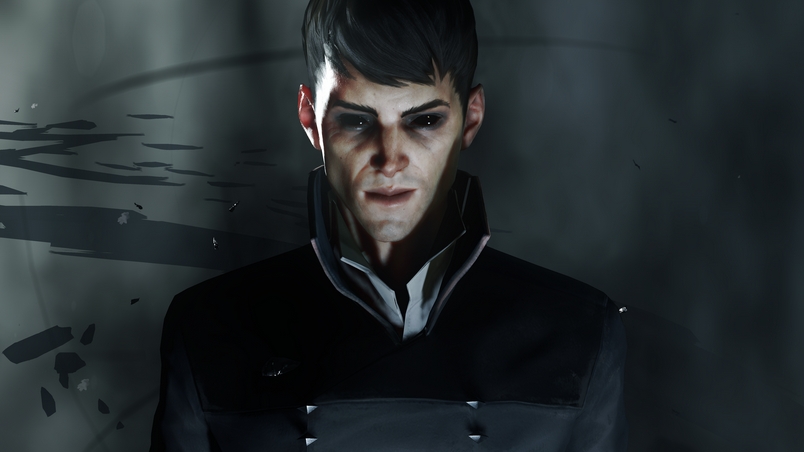
The following article contains plot spoilers for Dishonored 2.
The Dishonored series presents us with the continuous choice to do violence. We might sneak past every obstacle and neutralize each target with ironic nonlethality, or we can indiscriminately murder everyone who crosses our path. The choice, ultimately, is ours, but the one who asks us to make that choice is a character whose involvement in the games is both marginal and integral, and whose position has been badly misunderstood.
The Outsider is the sardonic god who offers us magical gifts at the beginning of both games. He is explicitly beyond our knowledge, yet continually draws us into intimate conversation throughout both games. His places are the hidden, marginal places of the world: the witches’ hideouts, the rat-filled sewers, the abandoned apartments inhabited by the mad or the wicked. His chthonic nature binds him to death and judgement. He is hated and feared by the powerful and worshipped by the destitute. Through this, he’s often seen by players as an archetypal Trickster figure, a kind of Loki or Satan meant to tempt us into an Lovecraftian nightmare of our own making. It’s easy to arrive at this interpretation, but it obscures the Outsider’s true role.
In Dishonored 2 we are shown a truth hidden in the deepest, oldest recesses of the Void. In this place, we witness the method behind the Outsider’s godhood: a ritual which merged a young, helpless boy with the vast, malevolent powers of the Void. Arbitrarily selected, anointed, and murdered, the Outsider is shown to be a sacrificial victim of an unknown, ancient cult which imbued him with tremendous power at the expense of his humanity.
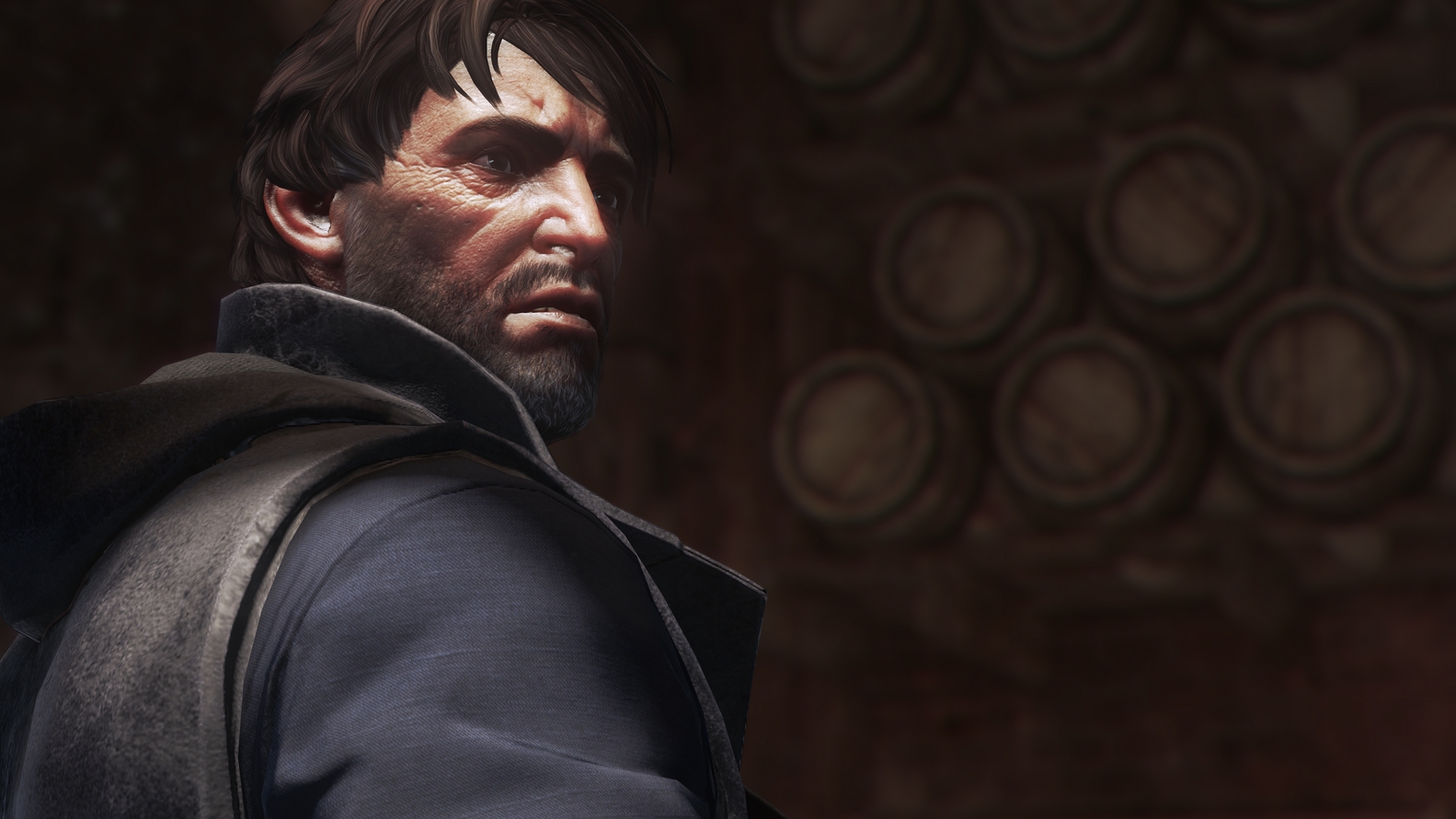
This paradoxical double meaning demonstrates the power of scapegoating, as curative violence ends poisonous violence.
This insight gives us a new way to understand the character and his involvement in both games’ thematic arcs. As a sacrificial victim pushed to the margins of society and reviled by the community that rejects him, he assumes the role of the 'pharmakos'.
'Pharmakon' is an Ancient Greek social ritual of catharsis, cleansing, and sacrifice. The victims, 'pharmakoi', were required whenever a threat, real or imagined, destabilized the borders and hierarchies of a community to the point of crisis. Disease, war, famine, or lack of resources could all disrupt the community to the point of escalating, all-encompassing violence. Quelling these becomes a psychic and social necessity to avoid irreversible damage. And so a pharmakos would be chosen from among the marginalised, and either ritually murdered or exiled. Typically bathed, adorned, and treated as sacred, this act of unifying violence through sacrifice would expel not just the victim, but also all the social ills that the victim would come to represent; all evil, violent, and immoral acts become associated with the pharmakos, regardless of his guilt.
The pharmakos is therefore granted enormous power by the community: he has the means to both destroy it and save it. It is no accident that the root word, 'pharma', means both ‘poison’ and ‘cure’. This paradoxical double meaning demonstrates the power of scapegoating, as curative violence ends poisonous violence.
The biggest gaming news, reviews and hardware deals
Keep up to date with the most important stories and the best deals, as picked by the PC Gamer team.
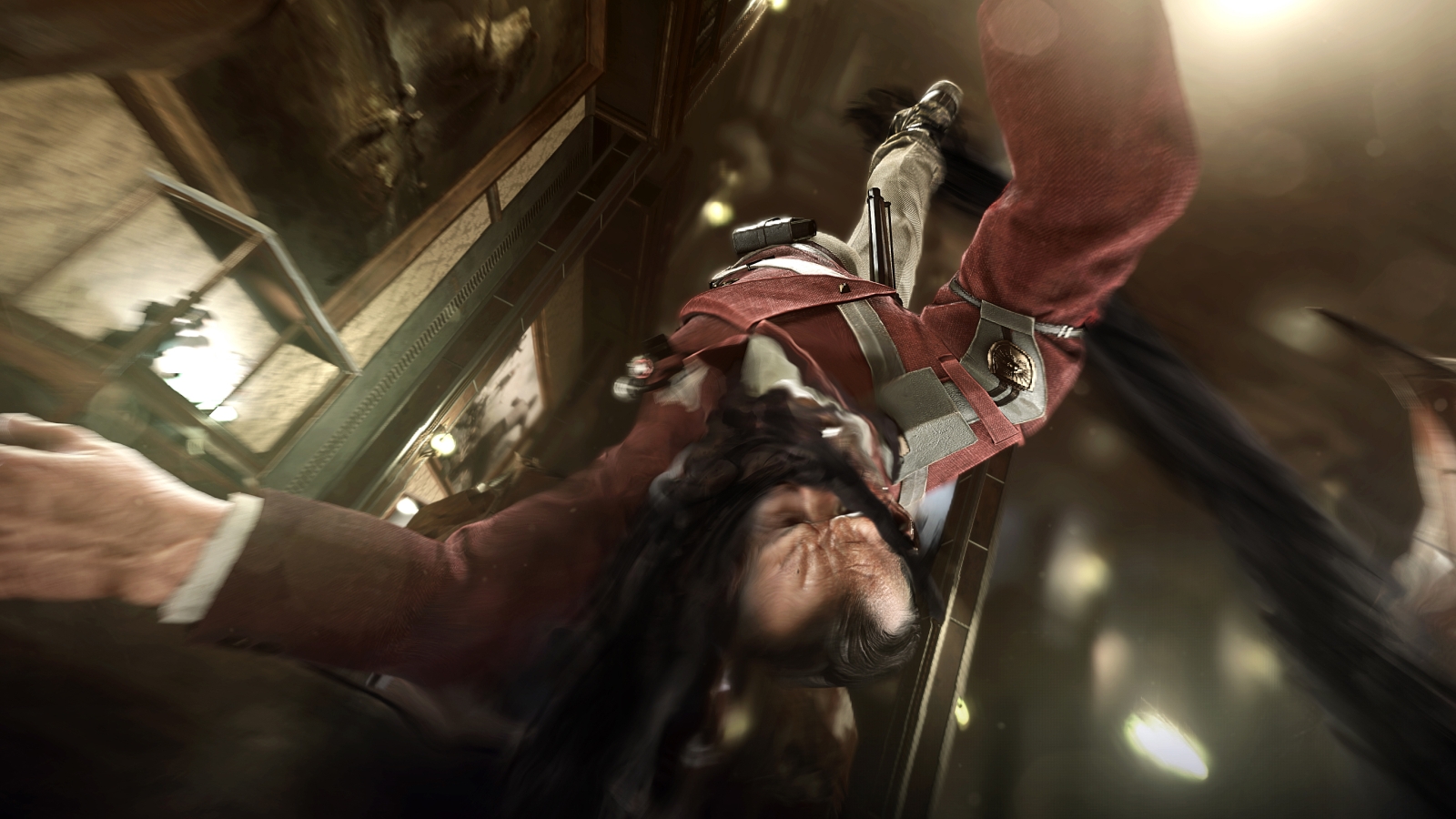
It might seem strange to draw connections between a modern day video game and Ancient Greek social ritual, but the themes and patterns that come to us from antiquity still have power over our lives. The most revered act of ritual murder across the globe, an event which underpins the language and literature of Western culture, is Christ’s crucifixion. We are preoccupied with sites of abuse and victimhood because of their ability to transcend boundaries that divide mankind. We are all vulnerable to violence; we are all vulnerable to abuses of power. Suffering is a facet of our lives that can level us all. How power employs, perpetuates, and quells violence within a community are questions we have explored throughout our history.
The Outsider is the thematic touchstone who both grants us the means to access the game’s content and provides the backdrop necessary to contextualise the choices we make.
The Dishonored series is a complex exploration of these themes, and the Outsider is the thematic touchstone who both grants us the means to access the game’s content and provides the backdrop necessary to contextualise the choices we make. He gives his gifts to the oppressed, the downtrodden, and the blamed. He revisits his own powerlessness when he reaches out to give a choice to the abused. His position within the Empire, forcibly outside its walls, gives him the power to ask these questions.
The Abbey of the Everyman, the only religious institution within the world of Dishonored, seeks to unite the different cultures and social classes of the Empire through rejection of the Outsider and his magic. What we mainly encounter of the Abbey’s role in both games are the Overseers, who are the militant witch-hunters zealously seeking out and destroying what they perceive to be the works of the Outsider. (We also briefly encounter artefacts related to the Oracular Order, the women’s branch of the Abbey; within pharmakos myths, Oracles are used to divine when a sacrifice is necessary.) Sea monsters, witches, black magic, wayward girls, thieves, murderers, etc, are all blamed on the Outsider’s influence. Some rightfully, most arbitrarily.
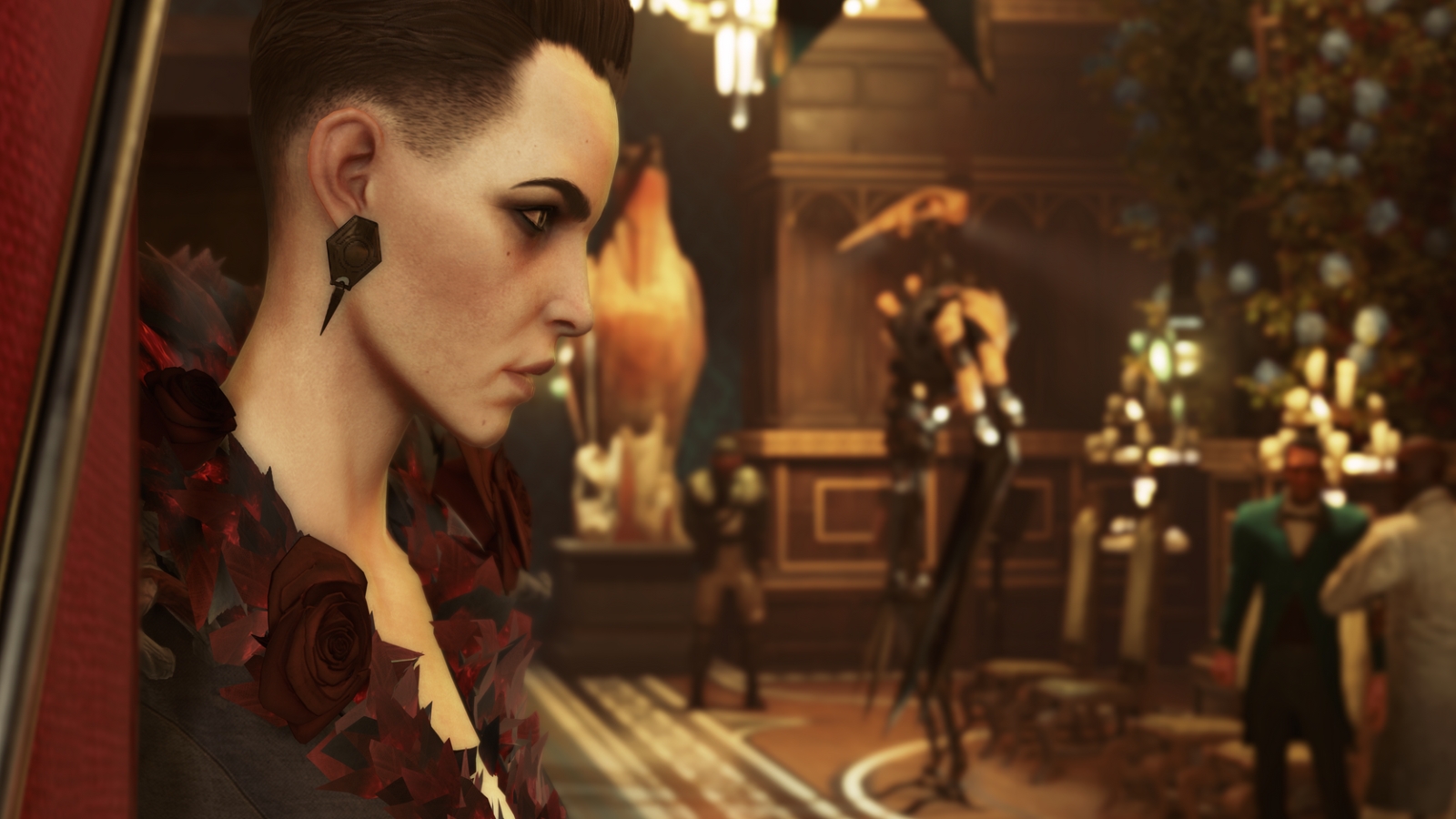
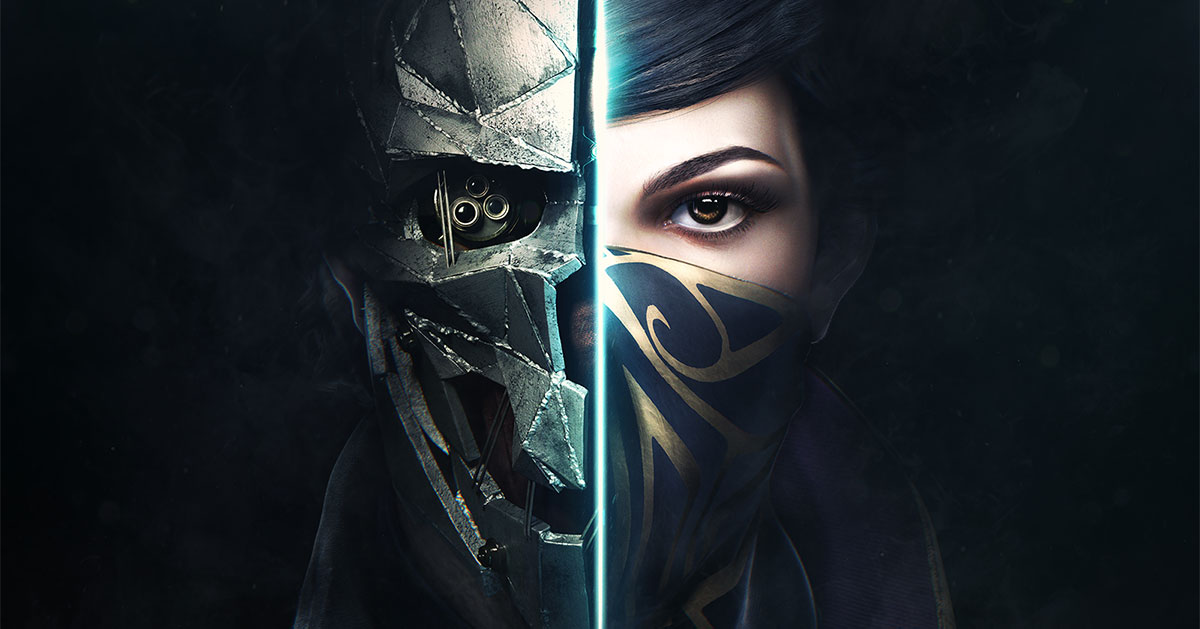
Dishonored 2 was our Game of the Year for 2016. Its depth, striking creative direction and respect for player freedom won our hearts despite a rough launch.
The Abbey calls for us to reject the strange and the different for the good of the community. Across both games, we may witness civilians threatened and killed in the street for various crimes against the Abbey. Understandably, performing magic in front of an Overseer in the sequel will instantly make him hostile. The way they speak echoes Biblical exhortations against evil. “We must cull the flock,” one says after executing a man for committing one of the many sins under their religion.
While this mimics how the Christian church regards Satan, it would be a mistake to view the Outsider solely in this light. The Outsider is not a tempter, sowing discord and offering power to bring people away from a righteous or compassionate path. Neither are his machinations meant to trick us into committing acts of chaos for a bored, eldritch boy-god to watch with amused delight. Ultimately, he wants to see power used justly rather than vengefully. Your violence only cements his cynicism; the Void might be chaotic, but the Outsider is not.
The player’s violent impulses are destabilizing to the point of crisis in both Dunwall and Karnaca.
Like the unnamed child whose abuse maintains the happiness of the city in Le Guin’s haunting short story ‘The Ones Who Walk Away from Omelas’, the Outsider’s origins in death and sacrifice is fundamental to the Empire itself. What would the Abbey of the Everyman be without the Outsider to constantly, ritually accuse of every social ill? Nothing. They would have no cohesion and no society. They would certainly have no power. Their religion relies on scapegoating in order to maintain their ordered society, and this tenuous foundation is one which is uniquely prone to outbursts of violence.
In both Dishonored games, violence is miasmatic. In the first game it is literally so: the plague proliferates more voraciously if the player is violent. Rats will strip the flesh from the rich and the poor alike. In the sequel this is represented again by bloodflies, which can infest parts of a level procedurally and make exploration more difficult even within the same map. The player’s violent impulses are destabilizing to the point of crisis in both Dunwall and Karnaca. As pharmakon demonstrates, it is in these moments, when order has utterly broken down and violence becomes as infectious as disease, that the only means of unifying a community is through scapegoating and sacrifice.
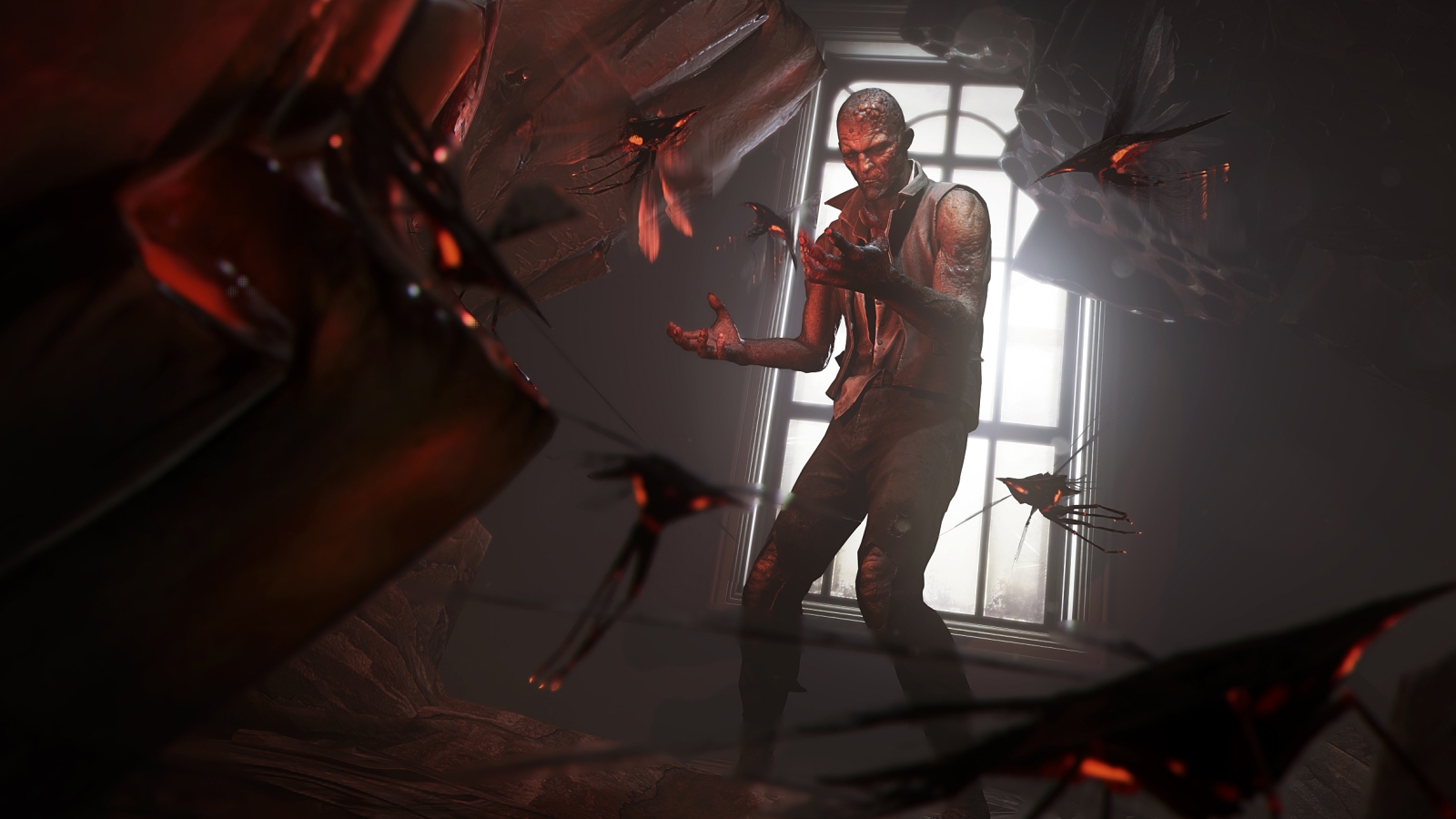
As a boy, the Outsider witnessed the cruelty and violence of a society maintained through sacrifice; as a god, he grants power to these victims of society and hopes, in the vestiges of his humanity, that it will not be abused.
Both Emily and Corvo lose their names, faces, and honour when they are wrongfully blamed and then exiled for the stability of the Empire; they, too, become pharmakoi. In the first game, we see graffiti scrawled across Dunwall, reading ‘The Outsider walks among us’. We play as Corvo, a foreigner to Gristol. We can’t know that it doesn’t refer to us. The tagline for the second game, ‘Take Back What’s Yours’, could easily be Delilah’s mantra as she steals the throne which she had, like Emily, been promised as a girl. The more violently Emily or Corvo seek to reclaim what’s theirs or to take revenge, the more indistinguishable they become from their adversaries.
We may be the poison that infects the city with horrendous, unending violence, or we might be the cure to quelling it without requiring another sacrifice.
What intrigues the Outsider most is when Corvo or Emily refuse to blindly mimic the violence and anger shown to them, and refuse to perpetuate the cyclical violence that calls for a sacrifice to quell it. Delilah uses the Outsider’s power to climb up from the gutter, claim power, and even uncover the secrets of his own creation. She rejects her status as a pharmakos when she was blamed and exiled for Jessamine’s misdeed. But when she engineers the coup that exiles Emily or Corvo to the margins of the Empire, the Outsider offers his powers to Delilah’s adversary. His attention is to structures, not necessarily individuals. His view of the world is much longer than one single sacrifice.

In ancient Greek, the word for gift is ‘dosis’, from which we derive the word ‘dose’. But a dose of what, we don’t know. When the Outsider offers us his gifts, there are more than two choices at play. We may be the poison that infects the city with horrendous, unending violence, or we might be the cure to quelling it without requiring another sacrifice. As the public brays for blood and the apparatus of justice and order execute dissidents in the streets, Dishonored asks us if the Outsider is as frightening as the walls which keep him out. We are invited to view the violence that maintains the hierarchies of Dunwall and Karnaca, and either take part or walk away. And the Outsider, a victim of this violence which preys on the weak and the dispossessed, looks on in surprise when we choose the gentler path.

